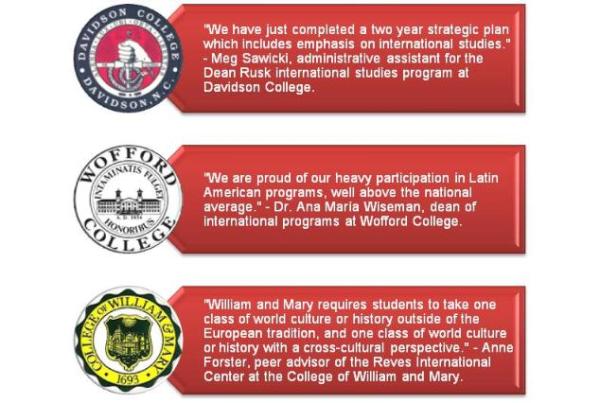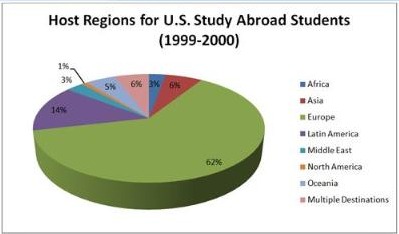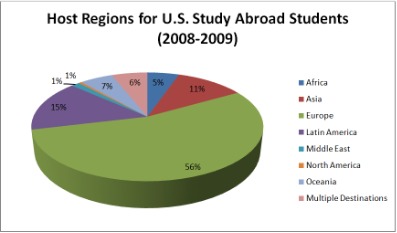Ashley Fahey

Elon University is striving to make its students “global citizens” – but what does this frequently undefined term really mean? Image credit to New England College.
Freshman Ling Zhou came to the United States and Elon University for her undergraduate studies because of the style of education, which is completely different than what is found in her hometown of Guilin, China.
“I really like how the U.S. teaches,” said Zhou. “You have more freedom to talk and the education here is more relaxed; you can be more creative. In China, you look more at the grades. Here, you look more at the creation.”
Creation has been one of the terms used to describe the increase of internationally-focused programs in liberal arts universities across the United States. Through initiatives and strategic plans, universities are striving to educate students and make them global citizens. Elon is following this path with The Elon Commitment.
But global citizenship frequently goes undefined. What does being a global citizen truly mean?
Liberal arts university students define it in different ways.
“Being aware of and concerned with cultures, peoples, and events across the globe.”
“A global citizen is a person who is knowledgeable and concerned about the state of the entire world, not just their local community.”
“Being a global citizen means being aware of what is going in the world around you, and knowing that what you do affects others all across the world.”
A few key words are constant: knowledgeable, concerned, aware and open-minded. But how are liberal arts universities making these definitions of global citizenship a reality for their students?

Many liberal arts universities are including global awareness initiatives and increasing international education opportunities at their schools. Image credit to Ashley Fahey.
Defining “global citizenship”
The Elon Commitment’s biggest concerns for the university are to diversify the student population and to make Elon students more globally aware.
According to Connie Book, assistant provost of Elon University, The Elon Commitment is a strategic plan with eight themes to affirm Elon’s place as a university known for academic excellence and exceptional student achievement.
“We started this plan a few years ago and began by watching other universities with the same goals,” Book said. “We did a lot of surveys and focus groups. The biggest issue was diversity, as students said they wanted more variety of language, color, domestic diversity and so on.”
She said one of the biggest conflicts students had with Elon University as a whole was the lack of conversations between individuals of different races, ethnicities, religions and backgrounds.

The building of a Global Village will house international students, the Isabella Cannon Centre, classrooms and an international cafe and theater. Image courtesy of Elon University.
“The plan has a domestic diversity commitment and a tripling international enrollment,” said Book. “We’re really focusing on recruitment to be a part of diversity. Additionally, we are building a Multi-Faith Center, increasing the number of foreign languages offered and dedicating a new residency called the Global Village to house international students.”
Currently, only 17 percent of Elon students are members of a diverse race or ethnicity, which is significantly low compared to other liberal arts universities in the country. She said increasing both international and domestic diversity is a large component of The Elon Commitment.
“We already had a good internationalism on the campus because we worked on that in our previous strategic plan,” said Book. “This new commitment is a deepening of those previous goals and paying special attention to the diversity of our campus.”

Elon University students on a Winter Term Barbados trip fulfill one of the many objectives Elon University has outlined in The Elon Commitment in making students global citizens. Image credit to Elon University.
Going global through study abroad
In order to get a thorough, full-circle international education, studying outside the U.S. for at least a month is necessary.
Elon University has been ranked as one of the top universities in the nation for study abroad programs, due to the high percentage of students who choose to study abroad at least once in their college tenure, according to the 2010 report from the International Institute on Education. Elon University was ranked the No. 1 master’s institution for the highest number of study abroad students.
“We have three different types of study abroad programs: semester programs, Winter Term programs and summer programs,” said Woody Pelton, dean of international programs and director of the Isabella Cannon International Centre. “These programs are all over the world.”

Elon has three Elon Centres throughout the world, including London, Florence and Costa Rica, which are popular study abroad destinations for Elon students. Image credit to Elon University.
One of the initiatives for the Isabella Cannon Centre is to introduce new programs in specific areas of the world. Pelton said new proposed Winter Term programs to be offered next year include Puerto Rico, Turkey and Greece, Dubai, Mexico and Vietnam. Most students choose to study in Europe, but there is a greater interest and gravitation toward other regions of the world, particularly in Asia.
“We research where student interest is and look at the most popular programs,” he said. “We’re now focusing particularly on Asia and South America.”
According to The Elon Commitment, another goal of the university is to reach 100 percent study abroad access. Currently, more than 70 percent of Elon undergraduate study abroad at least once, but due to lack of financial aid and demanding academic programs, many students cannot afford to fit in time to study abroad.
“Every department, if they work with us, can weave a study abroad program into their eight-semester program,” Pelton said. “I think it makes you better understand the United States and yourself because you have to look at it through a lens that’s different from what you have used all your life.”
Many students have eye-opening experiences during study abroad programs.
“My experience abroad put my learning into perspective because I had heard about all of the places I visited, but didn’t know what I would feel until I was actually there,” said Sarah Beese, a sophomore who traveled on the Winter Term Holocaust Journey this past January. “I never knew what it would be like to stand at the gates of Auschwitz until I experienced it firsthand.”

A pictorial representation of where students studied abroad during the 1999-2000 academic year. Image credit to Ashley Fahey.

A pictorial representation of where students studied abroad during the 2008-2009 academic year. Image credit to Ashley Fahey.
Students engage globally to burst the bubble
Part of assessing the success of making campuses more internationalized is examining how students are responding to the initiatives and what measures they are taking in order to become more globally aware. Student-led organizations, such as international-themed clubs and Project Pericles, strive to make students more internationally-educated and involved.
“We have meetings and several annual events such as Taste of the World, where students cook food and prepare drinks from other cultures around the world,” said Edith Veremu, an Elon sophomore and president of the Intercultural Relations Club. “Our goal is to serve as a forum of discussion in which international and domestic students can exchange ideas and cultures.”
Veremu said the students who attend the club are a diverse mix of both international and American students. At least 20 members show up to meetings each week.
“We create awareness and get to know other people who don’t have the same interests and views,” she said. “There are some people with whom I share similar experiences with and others that I have nothing in common with. It’s a great way to hang out and get people talking about different cultures.”
Veremu is originally from Zimbabwe but has lived in the United States for the past six years, which gives her a different perspective on both domestic and international issues. She said she decided to act as president for the club to not only gain experience as a leader, but to let her voice on cultural issues be heard.

Project Pericles at Elon University is an initiative by the university to transform students into global citizens. Image courtesy of Facebook.
Tom Arcaro, associate professor of sociology, leads Project Pericles, a program that combines both global citizenship and civic engagement objectives for students.
“I have tried to infuse and focus on understanding the connection between local and global, that they are interconnected,” said Arcaro. “It is important for Elon to have this focus. This is not PR rhetoric. This is what education should be across the board. This is our responsibility to provide models for the rest of higher education.”
He said it needs to be the priority of institutions everywhere to teach students to not simply fill jobs, but to fulfill a promise to make the world a better place.
“Project Pericles becomes a part of the DNA of the student,” said Arcaro. “The program is focused on taking on the part of the mission statement that says we integrate learning into the disciplines.”
According to Arcaro, Periclean Scholars have completed massive projects that have impacted entire global communities. He said the Periclean class of 2010 partnered with several villages in Ghana to raise the funds for and then to build an 11-room health clinic, in addition to a drug store and a kindergarten.
“We are literally creating the next generation of leaders that have to be globally involved and deeply skilled,” said Arcaro. “We can’t afford to wait and lag behind. Elon needs to be a leader and I fully endorse a commitment that underlines this promise.”
International students bring global awareness to campus
Part of The Elon Commitment’s goal for increasing global citizenship at Elon is to triple the number of international student enrollment by 2020. Elon reaches out to the world primarily through recruitment.
“Every year, Elon travels to various different countries throughout the world to visit high schools and attend college fairs,” said Cheryl Borden, director of international admissions. “This academic year alone, I personally have traveled for two weeks in Asia, three weeks in Latin America, another week in Central America and two weeks in the Middle East. The Dean of Admissions spent about nine days in Europe as well.”
Borden said Elon is constantly looking for ways in which the number of enrolled international students can be increased, and that the university targets specific regions.
“Through reports like the Institute of International Education (IIE) Open Door report, we receive information about which countries send the most students abroad for university studies as well as what the most popular majors are for international students,” she said. “If I had to qualify those regions, I would say that we look at Asia, Latin America, Europe and the Middle East primarily.”
As Elon is a relatively small university, it can be difficult to recruit many students. According to Borden, several factors are taken into account in the recruitment process.
 “We are continuing to build on Elon’s name recognition, and most importantly, ensuring that our current international students, who are the best representatives for a university, are having a positive experience here,” said Borden.
“We are continuing to build on Elon’s name recognition, and most importantly, ensuring that our current international students, who are the best representatives for a university, are having a positive experience here,” said Borden.
She said that international students ask about specific areas of interest to their needs.
“Issues such as available majors, campus climate, cost and academic requirements are important factors that students consistently ask about,” said Borden.
Zhou heard about Elon in a more unique manner.
“On a Winter Term exchange in high school, I went to Charlotte,” said Zhou, a freshman business major who will be at Elon throughout her four years of undergraduate studies. “Elon is not popular at all back home. I just happened to know about it through friends’ recommendations.”
Zhou said that her experience at Elon has been a good one.
“The class size is really amazing; I can get teachers’ attention and I can ask questions whenever I want,” she said. “People here are really nice and many of them have an open mind toward international students. There’s not a huge amount of international students, so I really get to get involved with American culture.”
The cost of a global education
A predicted estimate for all of the global citizenship objectives in The Elon Commitment is $295,905,000, according to Book. The total cost of all eight themes in The Elon Commitment is estimated at $586,156,000 when all objectives have been completed.
“This objective puts a lot of pressure on the university financially,” said Book. “We’re really going to have to raise money. It puts pressure on the alumni because, in order for this to be successful, giving back is so crucial.”
Book said in addition to putting pressure on Elon alumni, the annual Elon tuition will increase by 4 percent. Over a 10-year span of time, this increase will mean an additional $5,133 per student.
While The Elon Commitment is not the sole reason behind the tuition hike, it is a large reason for it. According to Book, though, need-based financial aid will increase from the less than $7 million in 2009 to a projected $13 million by 2020.

The tuition increase due in part to The Elon Commitment puts a damper for many current students financially. Image credit to Ashley Fahey and information courtesy of Elon University admissions.
Another problem that arises as a result of increased global citizenship objectives is the cost of studying abroad. Winter Term programs cost anywhere from $3,500 to $6,000. Semester programs are typically the cost of a semester at Elon, along with a study abroad fee, which is usually around $3,000 to $4,000.
Many of the programs that focus on global citizenship struggle as well.
“We’ve had to scrape together resources,” said Arcaro of Project Pericles. “As the program has grown, we’ve done more and more and more with no funding. I think we’ve done an amazing amount of things, but could we do more? Yes.”
And despite there being many initiatives underway to fulfill the global citizenship objective of The Elon Commitment, the term “global citizen” has yet to be fully defined. For now, it can define a multitude of people, ranging from a Periclean Scholar working internationally to help lesser privileged individuals, to a student studying abroad and living with a host family in a completely different culture to a future International Fellow residing in the future Global Village with students from across the globe.
